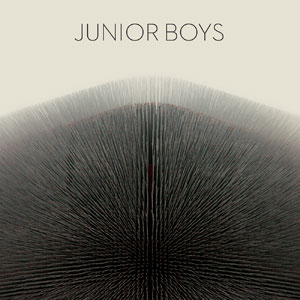Junior Boys It’s All True
Jeremy Greenspan and Matthew Didemus, the bi-continental pair behind Junior Boys, offer a fascinating new […]

Jeremy Greenspan and Matthew Didemus, the bi-continental pair behind Junior Boys, offer a fascinating new permutation of their melancholic electro-pop vision with It’s All True, the duo’s fourth full-length album. They manage to further refine what’s made them great to date—sublime pop songwriting and spotless production—while pursuing as many directions as there are songs on the album, exploding their sensibilities into several new shapes that, while incredibly varied, are both inspired and infectious, whether taken together or as individual tracks.
Much of It’s All True was created in Shanghai, where Greenspan, the duo’s vocalist and main songwriter, made a lengthy trip to begin writing and recording, later returning home to the duo’s studio in Hamilton, Ontario, where Berlin-based Didemus helped polish everything off. Other than the album’s cover photo of the UK Pavilion at the Shanghai Expo 2010, the recording locale does not have a particularly obvious effect on the record, but Greenspan did recruit local musicians to provide instrumentation, including the striking, stringed-instrument-inflected bridge of album opener “Itchy Fingers,” a busy laptop-pop song that kicks off the record with speedy insistence.
The album sounds immediately more buoyant than any of their previous, more brooding releases. It turns out to be more multifarious too, and this variety is initially a bit confounding—the shift from “Itchy Fingers” into the considerably slower, contemplative second track, “Playtime,” for instance, is pretty jarring at first, and the radical transitions only continue from there—but the album’s internal logic gradually reveals itself on repeat listens. What turns out to tie it all together is not only the quality of the songs, but Greenspan’s expressive vocals and the duo’s fundamental production instincts, molding what are, at face value, outmoded-sounding synth and drum patterns into endlessly listenable pop.
Greenspan has, in the past, championed the work of late, revered soft-rock session drummer Jeff Porcaro, citing him as inspiration for much of 2009’s Begone Dull Care, the comparatively inconsistent predecessor to It’s All True. The influence of Porcaro and his milieu sounds like it has carried over to Junior Boys’ craft here, where their forays into ’80s R&B-style production beget songs that turn out to be real treasures. This sensibility clicks particularly well on “A Truly Happy Ending,” which blends synths, piano, and mesmeric drum programming into an arresting groove. “Second Chance,” perhaps the album’s finest track, is a terrifically forlorn pop song, turning up incredible new hooks as late as five minutes into the six-minute tune. The record takes a turn into micro-house with “Kick the Can,” an effort reminiscent of earlier Junior Boys productions, while the record’s two most club-oriented tracks, “ep” and lead-off single “Banana Ripple,” are placed at the end of the album. The latter is a meandering, nine-minute house track that, while erratic, has enough stellar moments to constitute a most jubilant coda. It’s the record’s only shaky moment, really, and an enjoyable one at that.
After eight-plus years of releasing music, Junior Boys demonstrate handily with It’s All True that they remain fresh, luminous, and highly relevant. The album may not be as aesthetically cohesive as, say, 2004’s Last Exit or 2006’s So This Is Goodbye, but aesthetic uniformity appears not to have been the point with this record to begin with—its array of styles, disparate as they may seem, dovetail into a record of depth and lasting impact.

